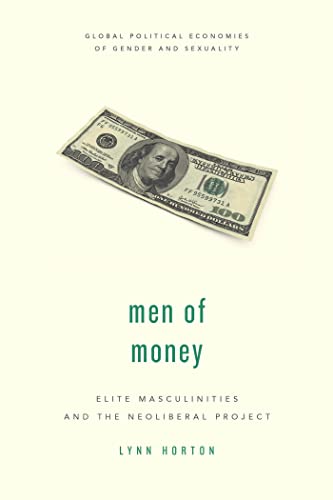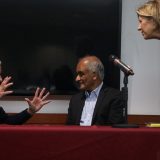
Horton Investigates the Wealthy in her Latest Publication Faculty Books
August 22, 2022
 In her latest publication, Dr. Lynn Horton (Sociology) examines a small group of highly visible billionaires in the financial and technology sectors—Mark Zuckerberg, Jeff Bezos, Bill Gates and others—who exercise enormous control over the global economy and our lives. Men of Money, explores the growing role of such billionaire networks in organizing advocacy campaigns to promote specific “free market” economic models and policies.
In her latest publication, Dr. Lynn Horton (Sociology) examines a small group of highly visible billionaires in the financial and technology sectors—Mark Zuckerberg, Jeff Bezos, Bill Gates and others—who exercise enormous control over the global economy and our lives. Men of Money, explores the growing role of such billionaire networks in organizing advocacy campaigns to promote specific “free market” economic models and policies.
The Voice of Wilkinson sat down with Dr. Horton to discuss Men of Money.
Voice of Wilkinson: Tell me about the book and why you wrote it.
Lynn Horton: Despite their immense wealth and power, few scholars have researched this sector of elite men at the top of the global economy. Likewise, I wanted to explore and understand how, what I call neoliberalism as an ideological project, is advanced and challenged through the public narratives about ultra wealthy men. This book also attempts to bridge the gap between issues of economic inequality and “identity politics.” I argue that elite class identity and gender and race are deeply intertwined, even as elite constructs of masculinity naturalize and universalize specific gender-coded values and practices.
VoW: What did you learn?
LH: I learned that while elite men in technology and finance are often portrayed as “geeks” who do not meet the traditional standards of full manhood status—physical strength and attractiveness and heterosexual prowess—in their own subcultures they have redefined norms of masculinity to center top status based on verbal and intellectual skills, and to demonstrate courage and domination through economic risk-taking and conquest. I’ve also been struck by how deeply gendered the fields of technology and finance are. It’s not simply that they continue to be male-dominated fields, but that their core public values and practices—hierarchy, individualism, competition, conquest—are highly masculinized, while feminine-coded practices—such as collaboration, interdependence, equality—are devalued. Similarly, the domestic labor of biological and social reproduction that sustains the economy and human life and is done disproportionately by women is marginalized in models of technocratic capitalism that emphasizes passion at the job and excessive work hours.
VoW: Tell me about the connections of technocratic elite masculinities and rightwing populist mobilization you detail in your book.
LH: I did content analysis of the discourse of the conservative think tank Heritage Foundation and the right-wing populist site, Breitbart, and found that they were highly critical of specific technocratic elites, both in politically partisan terms, but also as failing to meet core standards of masculinity. Right-wing populist discourse in particular emphasizes a highly racialized narrative that men of color as immigrants and “criminals” represent a “violent threat” to the nation and that technocratic elite men fail in their role as masculine “protectors.” In response, elite technocratic men, in their discourse at least, support gender and racial equality and often present themselves as the “heroes” fighting against racism. I suggest, however, that this good guy/bad guy binary may obfuscate ongoing patterns of gender and racial inequalities in the tech and finance sectors, even as the right-wing populist hyperfocus on street crime also draws attention away from potential unethical and white-collar criminal activities of elites.
VoW: What, do you think, will surprise readers?
In researching elites, it’s striking how much power a very small number of individual elite men has gained over the past decade over core aspects of the global economy, commerce, privacy, political speech, etc. These men and their companies operate in highly specialized technocratic fields that are not easily accessible to the layperson and they tightly control access to inside information. We have limited transparency and very little collective oversight over their actions and how they impact our lives and society in fundamental ways. This raises serious concerns for issues of global economic equality and, I believe, is a real threat to democratic governance.

